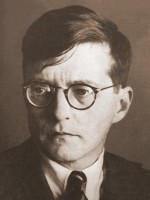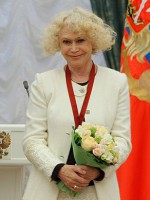Galina Vishnevskaya est une Actrice Russe née le 25 octobre 1926 à Saint-Pétersbourg (Russie)
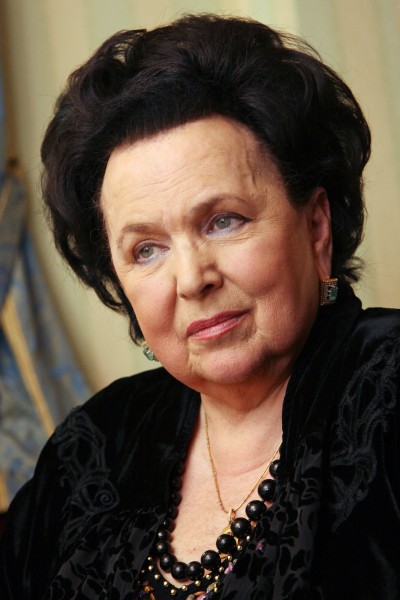
Galina Pavlovna Vishnevskaya (née Ivanova, Russian: Гали́на Па́вловна Вишне́вская) (25 October 1926 – 11 December 2012) was a Russian soprano opera singer and recitalist who was named a People's Artist of the USSR in 1966. She was also the wife of world-famous cellist Mstislav Rostropovich, and mother to two daughters, Olga and Elena Rostropovich.
On 9 May 1960, she made her first appearance in Sarajevo at the National Theatre, as Aida. In 1961, she made her Metropolitan Opera debut as Aida; the following year she made her debut at the Royal Opera House with the same role. For her La Scala debut in 1964, she sang Liù in Turandot, opposite Birgit Nilsson and Franco Corelli.
In addition to the roles in the Russian operatic repertoire, Vishnevskaya also sang roles such as Violetta, Tosca, Cio-cio-san, Leonore, and Cherubino.
Benjamin Britten wrote the soprano role in his War Requiem (completed 1962) specially for her, though the USSR prevented her from traveling to Coventry Cathedral for the premiere performance. The USSR eventually allowed her to leave in order to make the first recording of the requiem, though.
Vishnevskaya was married to the cellist Mstislav Rostropovich from 1955 until his death in 2007; they performed together regularly (he on piano or on the podium). Both she and Rostropovich were friends of Dmitri Shostakovich, and they made an electrifying recording of his opera Lady Macbeth of Mtsensk for EMI. According to Robert Conquest, Aleksandr Solzhenitsyn stayed at their dacha from 1968 while writing much of The Gulag Archipelago.
In 1974, the couple asked the Soviet government for an extended leave and left the Soviet Union. Eventually they settled in the United States and Paris. In 1982, the soprano bade farewell to the opera stage, in Paris, as Tatyana in Tchaikovsky's Eugene Onegin. In 1987, she stage directed Rimsky-Korsakov's The Tsar's Bride in Washington, D.C. In 1984, Vishnevskaya published a memoir, Galina: A Russian Story (ISBN 0-15-134250-4), and in 2002, she opened her own opera theatre in Moscow, the "Galina Vishnevskaya Opera Centre".
In 2006, she was featured in Alexander Sokurov's documentary Elegy of a life: Rostropovich, Vishnevskaya. In 2007, she starred in his film Alexandra, playing the role of a grandmother coming to see her grandson in the Second Chechen War. The film premiered at the 2007 Cannes Film Festival. In the last week of her life, she was awarded a supreme state honour by President Vladimir Putin.
Vishnevskaya died at the age of 86 on 11 December 2012 in Moscow.
Source : Wikidata
Galina Vishnevskaya

Nationalité Russie
Naissance 25 octobre 1926 à Saint-Pétersbourg (Russie)
Mort 11 décembre 2012 (à 86 ans) à Moscou (Russie)
Récompenses Commandeur de la Légion d'honneur, Officier des Arts et des Lettres, Ordre du Mérite pour la Patrie, Artiste du peuple de l'URSS, Ordre de Lénine
Naissance 25 octobre 1926 à Saint-Pétersbourg (Russie)
Mort 11 décembre 2012 (à 86 ans) à Moscou (Russie)
Récompenses Commandeur de la Légion d'honneur, Officier des Arts et des Lettres, Ordre du Mérite pour la Patrie, Artiste du peuple de l'URSS, Ordre de Lénine
Biographie
Vishnevskaya was born in Leningrad. She made her professional stage debut in 1944 singing operetta. After a year studying with Vera Nikolayevna Garina, she won a competition held by the Bolshoi Theatre in Moscow (with Rachmaninoff's song "O, Do Not Grieve" and Verdi's aria "O patria mia" from Aida) in 1952. The next year, she became a member of the Bolshoi Theatre.On 9 May 1960, she made her first appearance in Sarajevo at the National Theatre, as Aida. In 1961, she made her Metropolitan Opera debut as Aida; the following year she made her debut at the Royal Opera House with the same role. For her La Scala debut in 1964, she sang Liù in Turandot, opposite Birgit Nilsson and Franco Corelli.
In addition to the roles in the Russian operatic repertoire, Vishnevskaya also sang roles such as Violetta, Tosca, Cio-cio-san, Leonore, and Cherubino.
Benjamin Britten wrote the soprano role in his War Requiem (completed 1962) specially for her, though the USSR prevented her from traveling to Coventry Cathedral for the premiere performance. The USSR eventually allowed her to leave in order to make the first recording of the requiem, though.
Vishnevskaya was married to the cellist Mstislav Rostropovich from 1955 until his death in 2007; they performed together regularly (he on piano or on the podium). Both she and Rostropovich were friends of Dmitri Shostakovich, and they made an electrifying recording of his opera Lady Macbeth of Mtsensk for EMI. According to Robert Conquest, Aleksandr Solzhenitsyn stayed at their dacha from 1968 while writing much of The Gulag Archipelago.
In 1974, the couple asked the Soviet government for an extended leave and left the Soviet Union. Eventually they settled in the United States and Paris. In 1982, the soprano bade farewell to the opera stage, in Paris, as Tatyana in Tchaikovsky's Eugene Onegin. In 1987, she stage directed Rimsky-Korsakov's The Tsar's Bride in Washington, D.C. In 1984, Vishnevskaya published a memoir, Galina: A Russian Story (ISBN 0-15-134250-4), and in 2002, she opened her own opera theatre in Moscow, the "Galina Vishnevskaya Opera Centre".
In 2006, she was featured in Alexander Sokurov's documentary Elegy of a life: Rostropovich, Vishnevskaya. In 2007, she starred in his film Alexandra, playing the role of a grandmother coming to see her grandson in the Second Chechen War. The film premiered at the 2007 Cannes Film Festival. In the last week of her life, she was awarded a supreme state honour by President Vladimir Putin.
Vishnevskaya died at the age of 86 on 11 December 2012 in Moscow.
Le plus souvent avec
Filmographie de Galina Vishnevskaya (4 films)
Actrice

Alexandra (2007)
, 1h32Réalisé par Alexandre Sokourov
Origine Russie
Genres Drame, Guerre
Thèmes Politique
Acteurs Galina Vishnevskaya
Rôle Alexandra Nikolaïevna
Note67%





La Tchétchénie à l'heure actuelle, dans un campement de régiment russe. Alexandra Nikolaevna y passe quelques jours pour voir son petit-fils, l'un des meilleurs officiers de son unité. Elle y découvre un autre univers, une vie faite de misère et d'absence de sentiments. À moins que les forces et le temps ne manquent pour ces derniers. Ici, chaque jour, chaque minute, des questions de vie ou de mort se résolvent. Malgré tout, ce monde reste peuplé d'humains.
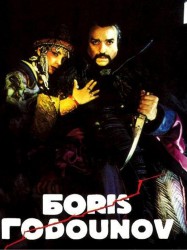
Boris Godounov (1989)
, 1h55Réalisé par Andrzej Żuławski
Origine Espagne
Genres Drame, Historique, Musical
Thèmes La musique, Musique, Adaptation d'un opéra
Acteurs Ruggero Raimondi, Delphine Forest, Anne-Marie Pisani, Galina Vishnevskaya
Rôle Marina Mnichek / l'aubergiste (chanteuse)
Note71%





Chambellan d'Ivan le Terrible, Boris Godounov exerce ensuite la régence pour Fédor Ier. À la mort de ce dernier, Boris Godounov devient tsar.
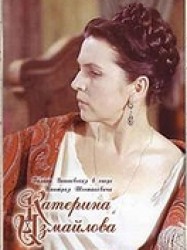
Katerina Izmailova (1966)
, 1h56Genres Drame
Acteurs Galina Vishnevskaya, Roman Tkachuk
Rôle Katerina
Note71%





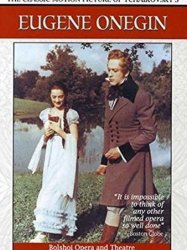
Eugene Onegin (1959)
, 1h48Genres Drame, Musical, Romance
Thèmes La musique, Musique, Adaptation d'un opéra
Acteurs Ariadna Shengelaya, Svetlana Nemoliaïeva, Galina Vishnevskaya
Rôle Tatiana Larina (voice)
Note72%





Eugene Onegin, a jaded young dandy from the big city of St. Petersburg, travels to the country to ingratiate himself into the affection of a dying uncle. There he meets the idealistic and romantic poet Vladimir Lensky, who introduces him to the daughters of a local landowner: Olga, with whom Lensky has strong affections, and Olga's younger sister Tatyana. Tatyana falls in love with Onegin. She writes him a letter pledging her love to him and telling him that she "is his." But Onegin rejects her in a polite, but cold and condescending sermon. Instead, angered by Lensky's dragging him to Tatyana's nameday party, he asks Olga to dance and flirts with her, much to Lensky's displeasure. Lensky challenges his friend to a duel with pistols. Seconds are appointed and, opportunities for reconciliation scorned, the duel takes place. Onegin kills Lensky and leaves the country estates to take a distant military assignment. Tatyana has disturbed dreams of Onegin and visits his uncle's estate to scan the books that he was reading so as to judge his character.
 Connexion
Connexion

